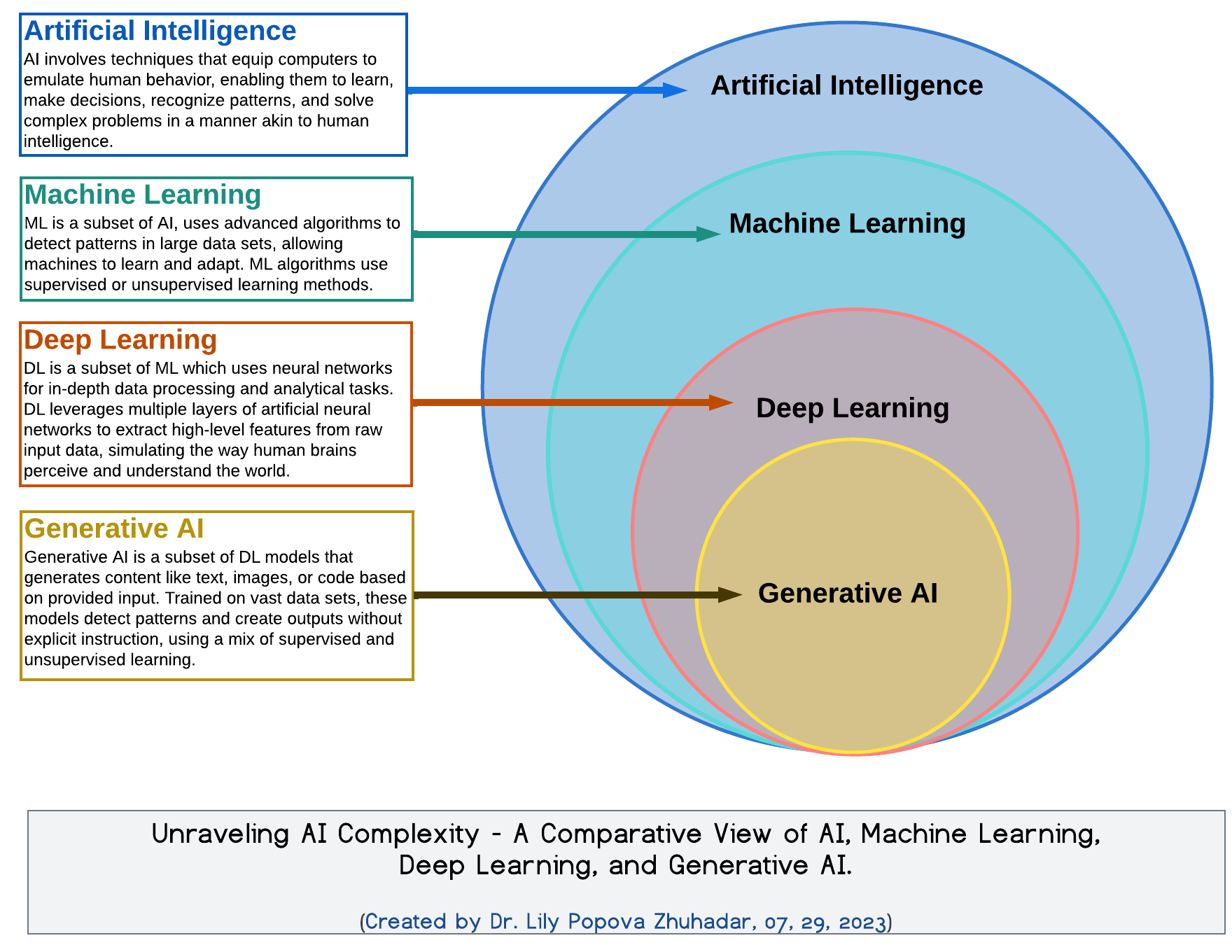
AI is changing the way leaders work, and it's happening fast. Did you know that 85% of executives think AI can help their companies stay ahead? It's true. AI is touching every corner of business, and it's shaking up how leaders do their jobs. Picture a future where AI helps leaders make better choices, sparks new ideas, and boosts how teams work together. In this piece, we'll look at how AI is changing leadership, how it's being used in training programs, and real-life examples of its impact. Whether you're experienced or new to leadership, knowing about AI could be your ticket to big growth and success. Let's explore how AI is shaping leadership today!
Summary: This article describes AI's role in transforming leadership dynamics, focusing on integrating AI into leadership development programs and presenting case studies on AI-driven leadership transformation. It includes a FAQ section to address common queries related to AI and leadership.
AI's Role in Transforming Leadership Dynamics
AI-Driven Decision-Making and Automation
Artificial Intelligence (AI) is transforming how leaders make decisions and strategize. With an AI-first leadership approach, the emphasis is on collaboration between humans and AI to achieve strategic goals. Midlevel leaders play a pivotal role in incorporating AI into daily routines, team operations, and broader organizational processes. This synergy of human and AI efforts facilitates strategy execution and drives meaningful change. By taking over routine tasks, AI allows leaders to concentrate on more human-centered work, enhancing overall performance.
Predictive Analytics in AI Leadership
Predictive analytics is a significant advantage in decision-making with AI. Tools like IBM Watson and Google Cloud AI empower leaders to forecast future trends by analyzing historical data. These tools identify patterns and predict outcomes, enabling businesses to anticipate market changes, customer behavior, and risks. By leveraging predictive analytics, leaders can adapt strategies to align with future scenarios, reshaping business models and work methods for increased value.
Real-Time Data Processing for Leaders
AI's capability to process real-time data is revolutionizing how leaders address immediate challenges. Platforms such as Microsoft Azure AI and Amazon SageMaker enable businesses to monitor and analyze data streams from diverse sources. This is crucial in high-pressure environments where quick decisions are imperative. For instance, in supply chain management, AI optimizes logistics and inventory in real-time, reducing costs and enhancing efficiency.
Automating Routine Leadership Tasks
AI-driven automation is assuming control of routine tasks, allowing leaders to focus on strategic objectives. Tools like UiPath and Automation Anywhere automate repetitive work across various industries. This boosts productivity and minimizes human error, ensuring leaders have reliable data for decision-making. By automating mundane tasks, AI provides leaders with more time for innovation and strategic thinking.
Essential Human Skills in AI Leadership
As AI becomes more prevalent in leadership, human skills are increasingly important. While AI excels at data processing and automation, it lacks the emotional intelligence and creativity inherent in humans. Balancing AI and human skills is essential for effective leadership today.
Emotional Intelligence in AI Leadership
Leaders utilizing AI must prioritize human-centered qualities such as empathy, inspiration, and adaptability. Emotional intelligence remains a cornerstone of effective leadership. Leaders must comprehend and manage their own emotions and those of their teams, fostering a positive work environment and effective communication. Although AI can assist by analyzing team dynamics, it cannot replace the profound understanding human leaders bring to relationships.
Fostering Creativity and Innovation
AI can identify data patterns, but it cannot replicate human creativity and innovation. Leaders must cultivate these skills to propel their organizations forward. Encouraging innovation involves taking risks and thinking creatively—areas where human intuition excels. While AI can support creative endeavors with data insights, the spark of innovation is inherently human. Investing in digital skills training and reskilling is crucial for leaders to motivate teams and drive continuous change in the AI era.

Ethical Decision-Making in AI Contexts
Ethical considerations in decision-making are another domain where human skills are indispensable. AI can provide data-driven recommendations, but it lacks the moral compass to assess the broader impact of decisions. Leaders must navigate complex ethical dilemmas, balancing business objectives with social responsibilities. As AI becomes more integrated into business operations, leaders need to uphold ethical standards, demonstrating accountability and integrity.
In summary, while AI enhances decision-making and automates tasks, human skills remain vital. The fusion of AI's capabilities with human intuition, creativity, and ethics will shape the future of leadership in our digital world.
Integrating AI into Leadership Development Programs
Enhancing AI Literacy for Leadership Success
In today's leadership landscape, understanding AI is essential. It's not just about knowing the technical details; it's about understanding how AI integrates into business, recognizing its strengths and limitations. Leaders must interpret AI outputs and make informed decisions based on them. This requires a commitment to continuous learning and staying abreast of the latest AI trends and tools.
Several programs are designed to enhance leaders' AI proficiency:
-
AI Leadership Accelerator by AIIR Consulting: A year-long, hands-on workshop that equips leaders with practical AI skills without requiring coding knowledge. The program includes practice groups and certification to facilitate ongoing learning.
-
Wharton's "Leading an AI-Powered Future" program: A six-week online course focusing on AI strategies to enhance workforce skills and build leadership confidence in an AI-centric world.
-
Harvard NPLI: This program leverages Generative AI to enhance crisis leadership skills through simulations and discussions on ethical AI, catering to leaders without a technical background.
-
Kellogg Executive Education's AI Strategies for Business Transformation: An eight-week course emphasizing strategic AI use to drive business change and innovation.
-
MIT Sloan's Leading the AI-Driven Organization course: A five-day in-person program covering AI technology, ethics, and workforce upskilling.
Balancing AI Tools and Human Leadership Judgment
AI excels at providing insights and aiding decision-making, but leaders must balance it with their judgment. AI can falter due to flawed data or algorithms, necessitating critical evaluation of AI outputs and their context before decision-making.
- Wharton AI leadership program: Emphasizes AI as a tool to support, not replace, human decision-making. It guides leaders in setting goals and taking action with AI assistance.

-
AIIR Consulting's AI Leadership Accelerator: Focuses on practical tools, such as the 3i Framework Prompt Cards, to help leaders leverage AI for innovation while maintaining human creativity.
-
MIT Sloan's AI leadership course: Discusses the ethical implications of AI and its impact on workforce dynamics, advocating for a balance between AI automation and human oversight.
-
Harvard's program: Includes discussions on ethical AI and case studies to prepare leaders for responsible AI use in crisis and resilience scenarios.
In practice, leaders trained in these programs use AI to enhance their decision-making. They integrate AI-driven insights with human ethical judgment and situational awareness. By fostering collaboration between AI and human expertise, leaders can make well-rounded decisions, ensuring AI and human intuition work in tandem. This balance enables organizations to harness AI's potential while preserving the human element in leadership, driving sustainable growth and innovation.
Case Studies: AI-Driven Leadership Transformation
Industry-Specific AI Innovations in Leadership
AI in Human Resources
AI is transforming human resources by streamlining complex tasks. Consider an early-stage company that utilized ChatGPT to develop its job family matrix and salary bands in just 10 hours—a process that typically takes weeks or even months. Impressively, they achieved 90% accuracy. AI also aids companies in revising employee handbooks to align with their objectives, creating quick learning paths, and summarizing complex proxy statements. These advancements demonstrate how AI enhances HR leadership by saving time and maintaining strategic focus.

AI in Investment and Financial Analysis
AI is revolutionizing financial decision-making. Companies are employing AI to delve into investment decisions, analyzing financial data, sentiment, and practical considerations simultaneously. This results in intelligent recommendations that significantly influence business choices. Additionally, AI processes vast amounts of competitive data, such as proxy information and annual reports, to generate easy-to-read comparison tables, reducing weeks of manual labor.
AI in Sales and Customer Service
Sales leaders, including top Chief Revenue Officers, are proactively building custom AI agents using tools like Claude and ChatGPT. This shift from vendor dependency to in-house AI development marks a significant change in sales strategies. Companies like Microsoft have clients, such as Groupama and Lloyds Banking Group, leveraging AI-powered virtual assistants to enhance customer service and productivity, illustrating AI's impact on leadership across various sectors.
AI in Innovation and Product Development
AI is driving innovation by predicting future demand more accurately than traditional methods. A global consumer goods giant developed an AI-powered innovation engine that increased product success rates by 25%, accelerated time to market, and delivered a ninefold return on investment. In the food and beverage industry, AI simulates the potential of new product features, combining sales forecasts and distribution data to recommend strategic next steps, leading to faster and more informed product decisions.
Explore more on AI-driven leadership transformation and AI-powered success stories.
FAQ Section
Balancing AI Integration with Human Empathy in Leadership
Leaders today face a challenging task: integrating AI into their work while maintaining a human touch. AI excels at processing data and generating quick insights, but it lacks the ability to understand emotions—an essential aspect of effective leadership. Leaders should aim to harness AI's strengths while relying on human creativity and decision-making. This approach allows AI to enhance human capabilities without replacing the empathy and emotional intelligence that are uniquely human.

Human judgment, emotional intelligence, and critical thinking are irreplaceable. Leaders can leverage AI for efficiency, such as analyzing large datasets, but they must also review and discuss results with their teams. This ensures that decisions incorporate both data and human values, maximizing AI's power while preserving strategic and empathetic thinking.
To achieve this balance, leaders should cultivate a culture that values both technological innovation and emotional intelligence. Offering training in AI and emotional skills can help everyone navigate this integration. Open communication and feedback are crucial for ensuring that AI supports rather than hinders human connections. By doing so, leaders can seamlessly incorporate AI into their leadership style without losing the human elements crucial for success.
Read more about AI-first leadership and embracing the future of work.
Essential Skills for Leaders to Integrate AI in Organizations
To successfully integrate AI into their organizations, leaders need a combination of technical, strategic, and interpersonal skills. A fundamental understanding of AI is essential. This knowledge allows leaders to align AI capabilities with organizational goals, enabling them to ask pertinent questions and utilize AI insights for informed decision-making.
An AI-first mindset is crucial, particularly for midlevel leaders who implement AI strategies into daily operations and team processes. This involves fostering a culture that embraces AI's potential and training employees to use AI effectively.
Critical thinking is also vital. Leaders must evaluate AI tools and manage risks such as bias and over-reliance. This involves scrutinizing the data AI uses and establishing systems for ethical use, understanding AI's limitations, and addressing issues like algorithmic biases or data privacy concerns.
Interpersonal skills, including communication and emotional intelligence, remain key. Leaders should engage in open dialogues with their teams about AI's role and address any concerns. They should create an environment where human and AI strengths complement each other seamlessly.
Finally, ethical judgment is a must. Leaders need to consider the ethical implications of AI, ensuring alignment with organizational values. By developing these skills, leaders can integrate AI while prioritizing human values and ethics.
Learn more about empowering people to unlock AI's full potential at work.
Risks of Over-Reliance on AI in Leadership Decisions
AI offers numerous advantages, but over-reliance on it for leadership decisions can be risky. One major concern is bias. AI is only as reliable as the data it is trained on. Biased data leads to biased AI decisions, resulting in unfair outcomes and undermining the human judgment and emotional intelligence essential for effective leadership.

AI systems can be complex and difficult to understand, leading to reduced transparency. This can erode trust and accountability within an organization. Leaders must ensure clear responsibility for decisions, even when AI is involved, and establish mechanisms to review AI-driven choices.
Other risks include reinforcing biases, job losses, generating false or useless information, and lacking emotional intelligence and accountability. Leaders should address these risks by staying informed, involving stakeholders, and focusing on ethical AI use to ensure decisions align with their values.
Over-reliance on AI can also stifle creativity and innovation. While AI excels at optimizing existing processes, it is not inherently creative. Organizations might miss out on fresh ideas stemming from human creativity.
Lastly, there is the risk of becoming too dependent on technology. If AI systems fail or technological disruptions occur, organizations could struggle. Leaders should ensure their teams can operate independently of AI, providing a safety net against technological hiccups.
Explore the potential risks and challenges of using AI in leadership.